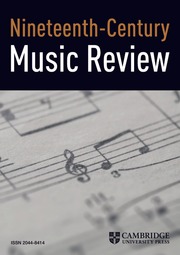Vera Wolkowicz is currently an Affiliated Researcher at the Instituto de Artes del Espectáculo ‘Dr. Raúl H. Castagnino', Facultad de Filosofía y Letras, Universidad de Buenos Aires. She holds a PhD and an MPhil in Music from the University of Cambridge and a BA from the Universidad de Buenos Aires She is the author-among other academic publications-of ‘La recepción de la ópera italiana en Buenos Aires a fines del período rosista: una polémica entre el Diario de la Tarde y el Diario de Avisos', in Dar la nota. El rol de la prensa en la historia musical argentina (1848–1943), ed. Silvina Mansilla (Buenos Aires: Gourmet Musical, 2012), 21–60; Música de América. Estudio preliminar y edición crítica (Buenos Aires: Teseo and Biblioteca Nacional, 2012), and is preparing a monograph titled ‘Inca Music Reimagined: Indigenist Discourses in Latin American Art Music, 1910–1930’ to be published by Oxford University Press. Her research focuses on Italian opera in mid-nineteenth-century Buenos Aires and Latin American musical nationalisms at the turn of the twentieth century.
David Larkin is a Senior Lecturer in Musicology at the Sydney Conservatorium of Music, University of Sydney. His research focusses on nineteenth-century ‘progressive' composers, exploring both their aesthetic programs and the practicalities of how their music was received. He has published on composers such as Richard Strauss, Liszt and Wagner in leading journals and edited collections, including 19 t h-Century Music, The Cambridge Companion to Richard Strauss, and three Cambridge University Press ‘Composer in Context' volumes. His current projects include an analysis of John Lanchbery's Merry Widow ballet adaptation, Viennese critical discourse in the mid-nineteenth century, and C. S. Lewis’s early Wagner obsession. He is also active as pre-concert speaker at the Sydney Opera House and as a concert and opera reviewer.
Jonathan Gentry is an Assistant Professor of History at Kennesaw State University, located in the greater Atlanta area. He specializes in the cultural history of German music with a particular emphasis on the reception of new music in the Nineteenth and early Twentieth centuries. His previous articles on Strauss, Mahler and their contemporaries ('Sound Biopolitics: Modernist Music and Degeneration in the Wilhelmine Empire'; ‘Critical Formalism: Max Graf, Julius Korngold, and the Language of “Modern Music” in Vienna around 1900’) were published by New German Critique and The German Quarterly. Jonathan received his Ph.D. from Brown University, where he was a Graduate Fellow at the Cogut Center for the Humanities. He is completing a book manuscript about German fears of musical degeneration from Wagner to the Weimar Republic.
Molly Barnes is currently a Teaching Fellow in Historical Musicology at Durham University. Her publications include ‘The Role of the Canon’, a chapter in the collection Art and Entertainment edited by Andy Hamilton (Routledge, forthcoming 2022). Her research specialties lie in nineteenth-century American musical life and especially the public, literary, and philosophical discourses surrounding the emergence of an infrastructure for Western classical music in the antebellum United States. She is now at work on her first book, which grows out of her doctoral work on the rhetoric of democracy and egalitarianism in American musical discourse of the antebellum era. This research has been supported by the American Musicological Society. Her broader research interests concern the relationship between musical canon formation and the emergence of cultural hierarchies in the West since 1800. She holds graduate degrees in musicology from the University of North Carolina at Chapel Hill.
Joanna Chang is a PhD student in musicology at Duke University, where she is advised by Dr. R. Larry Todd. Her dissertation explores various facets of the Brahms reception in the late nineteenth and early twentieth-centuries. She has presented papers at meetings hosted by the American Musicological Society, Centro Studi Opera Omnia Luigi Boccherini, as well as the American Brahms Society. Prior to her studies in musicology, Ms. Chang received a DMA in piano performance.
Dan Deutsch is a teaching fellow at the Hebrew University of Jerusalem Musicology Department, where he also conducted his research as an Azrieli postdoctoral fellow. Dan earned his Ph.D. from the University of Toronto Faculty of Music and the Anne Tanenbaum Centre for Jewish Studies. At present, Dan is exploring the negotiation of Jewishness in nineteenth-century German music. In combining methods of musical formal analysis and cultural history, he specifically analyzes the instrumental music of German-Jewish composers as an act of mediation between their own Jewishness, the prospect of Germanness, and German society. Dan's work was published in various venues, including Music & Letters and the Yuval.
Philip Boardman is a retired Police officer who completed an undergraduate music degree at the University of Salford on leaving his occupation. He is currently a postgraduate research student at the University of York investigating the emergence of the brass band tradition in Manchester and surrounding areas from 1840 to 1880. Philip has played with brass bands since learning to play the tenor horn at school and has a keen interest in all matters connected with the origin of these unique musical ensembles.
Eva Branda holds a Ph.D. in musicology from the University of Toronto and teaches at Wilfrid Laurier University. With special attention to Dvořák, her research focuses primarily on reception issues in the late nineteenth century. Dr. Branda has presented papers at many conferences, including annual and chapter meetings of the American Musicological Society; Nineteenth-Century Music; the Association for Slavic Eastern European and Eurasian Studies; and the annual conference of the Canadian University Music Society (MusCan). Her work has appeared in the Journal of the Royal Musical Association and in Music & Letters. She also has a forthcoming article in the Cambridge Opera Journal and will be contributing a chapter to the book A History of Music in the Czech Lands, to be published by Cambridge University Press in 2024.



